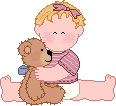Lady's Heart of the Home |

Play Nice: Getting Toddlers to ShareCarren W. JoyeOnlinePlaygroup.com All parents want their children to share and cooperate with others. Unfortunately, toddlers and preschoolers are just learning how to socialize and how to share, and sharing is a skill that takes time and practice. As a parent, you need to help them learn. We often tell our young children to "play nice," but this is like telling them to multiply or to divide. They do not know how to share, so it does not do any good to tell them to do it. Rather than let the little tots work things out among themselves, you sometimes need to intervene to show them how to share and show them why they need to share. Here are some ways parents can promote sharing and cooperation and prevent conflicts with sharing. Show them how to shareInstead of telling them to take turns, show them how to take turns. If a little boy and little girl are fighting over a toy, for example, suggest that the little boy play with it for a short while and then it will be the girl’s turn. Help her find another toy to play with until it’s her turn. After a short while, remind the little boy that it is the little girl’s turn with the toy. Then, if necessary, help him find something else to play with. Praise him for remembering to give her a turn, and praise her for waiting patiently. Alternatively, show them how to play with the same toy together, such as rolling a ball or pushing a truck back and forth to each other. Games such as these foster cooperation in children. Sometimes, if the youngsters are old enough, you may be able to prompt them to come up with ways to cooperate and share on their own. Say something like, "Looks like both of you want to play with that toy. What are you going to do? How can you two work this out?" Children are sometimes more cooperative if they feel like it's their own idea. Prevent conflicts with sharingSometimes you can prevent conflicts by preparing in advance. If you are hosting a playdate in your home, have two or three of the same toy so youngsters do not have to share. If this proves impossible, have several of the same type of toy, such as several dolls or several cars. Also, because toddlers find it difficult to share materials from a common pile, you may try dividing the toys into separate piles for each child. If you make it clear that one pile belongs to this child, and another pile belongs to that child, you will avoid a lot of arguments among the children. Another way to alleviate problems is by helping your children put away favorite toys before any playmates arrive. This will not only prevent conflicts with sharing, but also prevent toys from accidentally getting broken. Remind your toddler that his toys remain his. Reassure him that his friends will not take his toys home with them. If you are visiting someone else and your child wants to bring a special toy, remind him that he will have to share it with the other children. Encourage him to leave it at home or in the car, or suggest that he choose something else. Finally, before your guests arrive or before you get to the play date, tell your child what you expect. Don't just say, "Play nice." Be specific. Tell him, "Do not snatch toys away from anyone. You have to take turns and share toys even with the babies." Teach them why they need to shareAdults share because we care about the other person’s feelings and because it makes us feel good to make others happy. Give your children opportunities to help other children, so they will learn that it feels good to help others. For example, let them pass out the snacks or show another child how to build a puzzle. Then praise them for their helpfulness and emphasize how good it must have made them feel. Help children learn to recognize other people’s feelings by specifically pointing out the consequences of their actions. Tell them, “Brendon is crying because you took his toy away. How do you think he feels? How do you feel when someone takes your doll away from you?” Praise good behavior by being specific too. Don’t just say, “How nice of you.” Instead, say something like, “You shared because you like to help others. You’re a good friend to Brendon. Look how happy he is that you shared your toy.” Read stories about sharing and talk about them. You can use books about sharing, such as "Mine!: A Sesame Street Book about Sharing" by Linda Hayward, "I Am Sharing" by Mercer Mayer, and "It’s Mine" by Leo Lionni. Or you can bring up the topic of sharing as it comes up in other stories, such as the seven dwarves sharing their home with Snow White. Finally, teach by example. Let your children see you sharing, cooperating and being considerate of others, and they will try to imitate you. Carren W. Joye is the author of A Stay-at-Home Mom's Complete Guide to Playgroups (ISBN 0-595-14684-8; $13.95). A homeschooling mom of four children, she has founded five successful playgroups and helped start countless other playgroups around the world. Visit her web site at http://www.OnlinePlaygroup.com for more information about playgroups. This article provided by the Family Content Archives No right click ResourcesLinks are provided for your information and enjoyment. The links do not imply endorsement of the sites' products or advice.Web News & Articles PRweb: Parenting PRweb:Children MagPortal: Parenting & PG Topix: Parenting Parenting Tips for Busy Moms Topix: Kids About: k-6 Backwash: Home & Family Backwash: Women Lady's HOTH ResourcesHeart of Family BlogFamily Life Message Board Newsletter More family articles Get latest headlines at My Yahoo!, Gator News, My MSN, and other newsreaders   
|